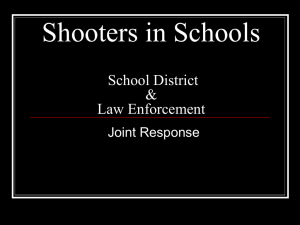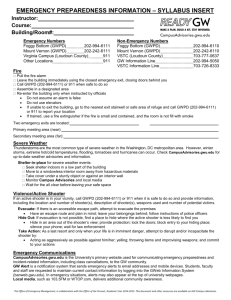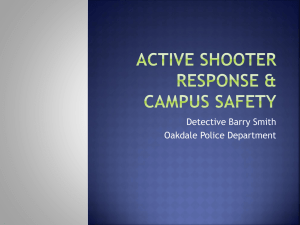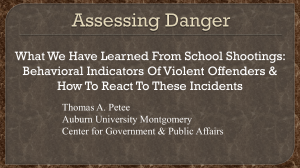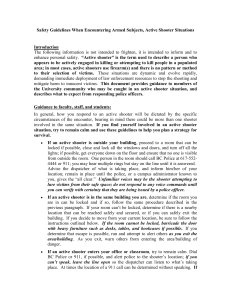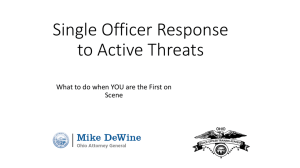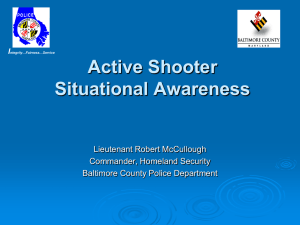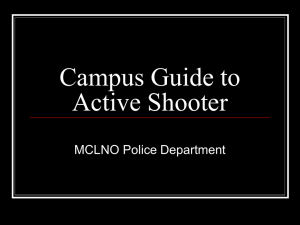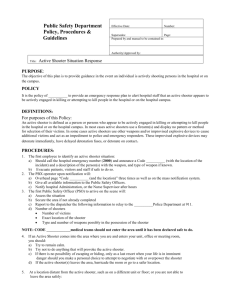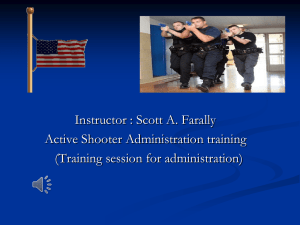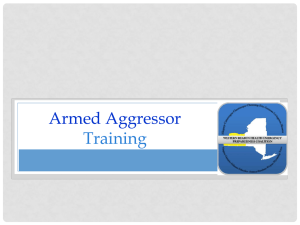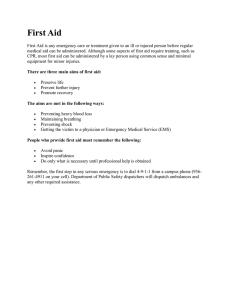ACTIVE SHOOTER HOW TO RESPOND
advertisement
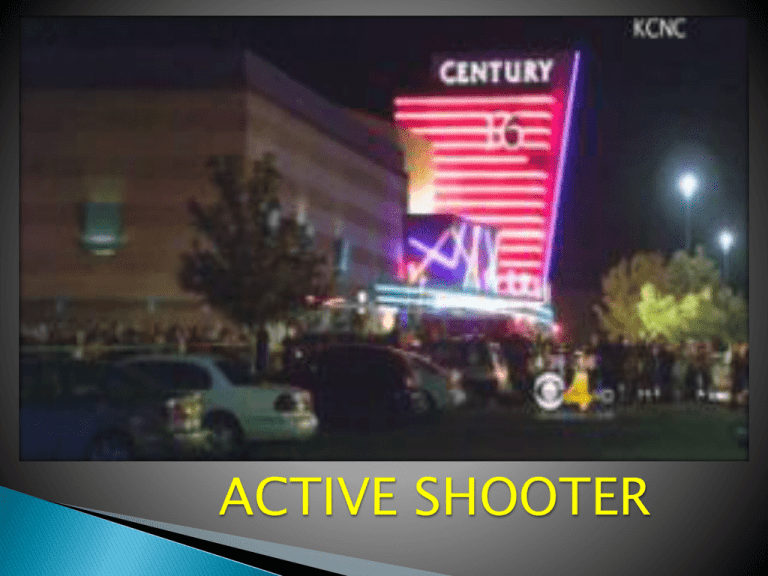
ACTIVE SHOOTER An Active Shooter is an individual actively engaged in killing or attempting to kill people in a confined and populated area and there is no pattern or method to their selection of victims. Active shooter situations are unpredictable and evolve quickly. Typically, the immediate deployment of law enforcement is required to stop the shooting and mitigate harm to victims. ABB Shooting, St. Louis – 2010 4 dead and 5 injured Neosho Church Shooting – 2007 3 dead and 5 injured Because active shooter situations are often over within 10 to 15 minutes, before law enforcement arrives on the scene, individuals must be prepared both mentally and physically to deal with an active shooter situation. Be observant of surroundings and report suspicious behavior. Formulate a plan as a family in the event of an emergency. Choose seats that allow a good vantage point and a hasty exit. Avoid opening night and large crowds that make easy targets. If you are going into a dark area, have a bright flashlight. 1. Figure Out! – Decide your best course of action. • A. Get out: can you safely escape? • B. Hide out: is there a good place to hide? • C. Take out: will you take out the shooter? 2. Get Out! • A. If you can, escape, get out. • B. Trust your instincts. • C. Leave belongings behind. 3. Hide Out! • A. Find a hidden location. • B. Find protection. • C. Avoid places that trap or restrict movement. • D. Spread out (don’t huddle) – this gives options for escape and movement and makes you a harder target. 4. Call Out! • A. Don’t assume someone else is calling. • B. Call police for help. • C. Be persistent when calling, telephone lines may be jammed. • D. Calmly state where you are and what is happening. 5. Keep Out! • A. Find a room that locks. • B. Blockade the door. • C. Be silent. • D. Turn out the lights and turn off the noise (i.e., silence, but don’t turn off cell phones, etc.). 6. Take Out! • A. Make a plan. • B. Act as a team. • C. Commit completely to your action plan. • D. Do whatever necessary to neutralize the situation. 7. Help Out! – If possible • A. Help others stay calm. • B. Help others escape. • C. Warn others. • D. Help the injured. • E. Keep others away from danger area. Location of the active shooter. Number and type of weapons held by the shooter/s. Number of shooters, if more than one. Physical description of shooter/s. Number of potential victims at the location. Police are trained to proceed as quickly as possible to the sound of the gunfire. Their purpose is to stop the shooter. Officers may be in plain clothes, patrol uniforms, or SWAT uniforms armed with long rifles, shotguns, and/or handguns. They will have identification. Do as the officers direct you, and keep your hands visible at all times to show the officers you are not a threat. If possible, tell the officers where the shooter was last seen, and provide a full description of the shooter and any weapons used. Also, be aware that the first responding police officers will not stop to assist injured people. Others will follow to treat the injured. First responding officers are trained to proceed as quickly as possible to gunfire and stop the shooter. WHEN LAW ENFORCEMENT ARRIVES ON THE SCENE Remain calm, and follow officers instructions. Avoid pointing, screaming and/or yelling. Immediately raise hands and spread fingers. Keep hands visible at all times. Avoid making quick movements toward officers such as attempting to hold on to them for safety. Do not stop to ask officers for help or direction when evacuating, just proceed in the direction from which officers are entering the premises. Trained • Feel anxious. • Recall what they’ve learned. • Prepare to act just as they’ve rehearsed. • Commit to action. Untrained • Feel panic. • Are in disbelief or denial. • Are in shock. • Descend to helplessness. Remember to constantly be aware of your surroundings. Active shooter situations are extremely unpredictable and traumatic, but they are survivable. Have a plan in place and give your family the best chance to survive!
